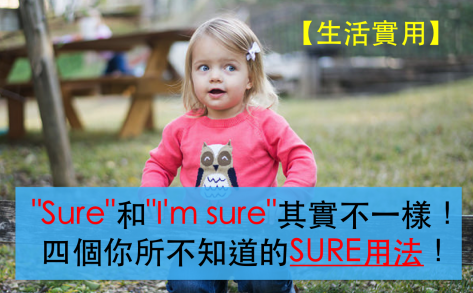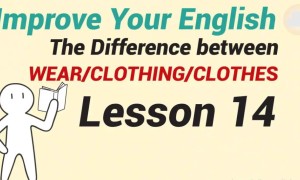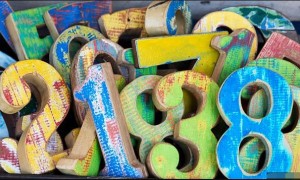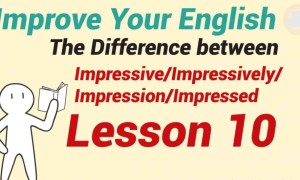学习重点整理
1. Sure. → 是的,表示肯定地回答
当你翻开字典,sure最常见就是作形容词解释「必然的、确信的」,但在老外的口语对话中,sure基本上就等于“yes”,是一个很中性的用法,纯粹在回答对方的话,并表示肯定。
e.g.
A: Would you like to see a movie with me?
你愿意跟我去看场电影吗?
B: Sure.
好啊。
2. Sure, sure. → 表示同意,但是带一点不耐烦、应付了事的感觉
sure说一次就够了,为什么要说两次呢?目的就是加强语气,但这里其实带有不耐烦、敷衍回答的意味, 如果你正在忙没空回答,或是对方是一个你讨厌的人,你其实不想与他搭话,这时就可用”Sure, sure.”给一个敷衍的回答。意思就是“Sure, go ahead.”或“Yeah, yeah don’t bother me.”「对对对,就是那样(少烦我)」
e.g.
A: Excuse me, Sir. So the answer to the equation is one, right?
老师,不好意思请问一下,所以这题的解答就是1,对吧?
B: Sure, sure.
没错!就是这样! (言下之意可能是,老师现在可能正忙着赶课,没有多余时间在跟学生哈拉)

3. I’m sure. → 必然如此,绝对是
这是一个百分之百确定的说法,表示对自己的话或表现很有信心,立场明确、不容怀疑,确信程度又比sure, sure更高。也就是“I totally believe it is correct.”或“I am one hundred percent certain on it.”的意思。
e.g.
A: Are you sure this is the right direction? I don’t see any convenience store along the way.
你确定这方向是对的吗?我沿路上完全没看到一家便利商店。
B: I’m sure. I’ve passed through the street last weekend. It can’t be wrong.
我很确定就是这方向没错!我上周末才经过这条街,不可能会错。
4. Sure, … → 说反话,实际上表达反意
sure表面上是同意,但实际上却是讽刺性(sarcastic)的说法,也就是你根本不认同。
再看一次James老师的解说与例句,他的表情和语气把这个反讽的用法描绘得很贴切!
↓↓↓点击以下连结看解释与例句↓↓↓
“SURE”有比你想像更多的意思
补充:sure相关片语
・make sure 确保;查明
e.g. David went home and make sure whether he locked the door or not.
David回家确认是否有锁上大门。
e.g. Make sure that Mom doesn’t know I didn’t come back last night.
你要向我保证妈妈不知道我昨晚没回家。
・for sure 确实地、的确
e.g.
A: It is so hot today.
今天实在太热了。
B: That’s for sure. I feel like I’m melting.
真的!我觉得热到快融化了。
・sure enough (常放句首)果真如此;想当然尔
e.g.
I said she would win the competition in the second round; sure enough, she made it!
我就说她会在第二回合胜出,果真,她最后赢了!







